Caryn
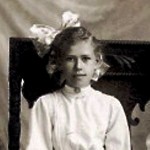 Whenever I read through my Great Aunt Bertha Schumacher Hallgren’s journal, I find something new. I may have read it before, but somehow, a new thought jumps out at me this time. Yesterday, as I was looking through it, I saw what a visionary she was. Many people kept clear family records, dating back for centuries, but the one thing that many of those records were void of was the stories that made up the lives of the people who were listed there. Aunt Bertha mentions that so much of how life was for our grandparents or great grandparents is being lost, because people only kept the birth, death, and marriage records, and never really told the future generation what their ancestors felt like. She was so right.
Whenever I read through my Great Aunt Bertha Schumacher Hallgren’s journal, I find something new. I may have read it before, but somehow, a new thought jumps out at me this time. Yesterday, as I was looking through it, I saw what a visionary she was. Many people kept clear family records, dating back for centuries, but the one thing that many of those records were void of was the stories that made up the lives of the people who were listed there. Aunt Bertha mentions that so much of how life was for our grandparents or great grandparents is being lost, because people only kept the birth, death, and marriage records, and never really told the future generation what their ancestors felt like. She was so right.
I often look for something more in the different sources that I use to build my family history, and even when there is a story, often it is simply and statement saying that the person died on a given day, and was buried in a certain place. While that can be good information, it doesn’t really tell anything about the person. I want to hear about their life. I want to know about some exciting things that they accomplished. Often, people don’t even post their obituary in it’s entirety. That is another sad thing, because it makes it hard to know for sure is this particular person is the ancestor you are looking for. The obituary would tell about their parents, siblings, children, and grandchildren. That information alone can fill in a history that has been missing a lot of really interesting and important information.
Birth and death certificates are another area that seems to be sorely missed in the actual media area of a persons information of Ancestry. Wehn you want to know about an epidemic that has hit, you have a real struggle on your hands. Much research is needed to find out what cause the deaths of people in the not so distant past, and it can be really frustrating. Marriage certificates are hard to find too sometimes. It really makes me sad that all of this documentation is missing from history, and all the stories about life are missing 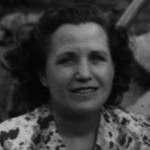 too. It really is up to us to make sure they get in there, just like my Aunt Bertha points out. Just knowing the dates does little to show who they really were.
too. It really is up to us to make sure they get in there, just like my Aunt Bertha points out. Just knowing the dates does little to show who they really were.
I’ve been guilty of this myself. You get in a hurry, and forget to put in the personal information. I suppose it does help that I have written stories about these things, but I have not necessarily connected them with Ancestry, so that other people would be able to read some of it. I can see that I’m going to have to start doing a better job of putting in the stories that go with some of the people I am researching. People’s lives have so many interesting stories in them…so many twists and turns in their journeys, and I want to be like my Aunt Bertha, and pass that information along for posterity.

 The Japanese navy in 1942 was a power that seemed impossible to beat. They had not lost a battle since their defeat the Battle of Shimonoseki Straits in 1863. It was the goal of the Japanese operation to eliminate the United States as a strategic power in the Pacific…the same reason the attack on Pearl Harbor was important to them. On June 4, 1942, Japanese Admiral Chuichi Nagumo, commander of the fleet that attacked Pearl Harbor, launched a raid on Midway Island with almost the entire Japanese navy. It was to be a decisive battle. Their plan was to make another power grab that that would widen their sphere of influence and conquest. They set their sights on Midway, an island group in the central Pacific, as well as on the Aleutians, off the coast of Alaska. The United States Navy was badly wounded, and the Japanese were determined to finish it off.
The Japanese navy in 1942 was a power that seemed impossible to beat. They had not lost a battle since their defeat the Battle of Shimonoseki Straits in 1863. It was the goal of the Japanese operation to eliminate the United States as a strategic power in the Pacific…the same reason the attack on Pearl Harbor was important to them. On June 4, 1942, Japanese Admiral Chuichi Nagumo, commander of the fleet that attacked Pearl Harbor, launched a raid on Midway Island with almost the entire Japanese navy. It was to be a decisive battle. Their plan was to make another power grab that that would widen their sphere of influence and conquest. They set their sights on Midway, an island group in the central Pacific, as well as on the Aleutians, off the coast of Alaska. The United States Navy was badly wounded, and the Japanese were determined to finish it off.
The Americans were weakened, that was true, but the Japanese sorely misjudged the determination of the American warrior. The Yorktown had been damaged, and there would only be three days to get her repaired and ready for battle. She would be used, along with the Enterprise and the Hornet for this battle. They were all that was left of the aircraft carriers after the attack on Pearl Harbor. The question on the minds of everyone…would it be enough? Only time would tell. And there was no more time. The battle had begun.
The attack came in the morning, on June 4th. Admiral Nagumo wanted to lure the United States aircraft carriers into a trap. He launched his first strike with 108 aircraft…bringing significant damage to the US installations at Midway. The Americans struck back over and over, but accomplished little, losing 65 of their aircraft in those first attempts. The Japanese admiral was sure that his plan had worked. He could almost taste victory, but he had underestimated the tenacity and determination of Admiral Chester Nimitz and Admiral Raymond Spruance, the commanders of the American forces. Admiral Nagumo ordered a second wave of bombers to finish off what he thought was only a remnant of American resistance. This was when he found out just how wrong he had been, and how badly he had misjudged the Americans. The American Admirals had anticipated the attack on Midway, and they managed to conceal their position because of good reconnaissance, which gave them sufficient opportunity to rearm.
The Americans sent in 55 US dive-bombers to take full advantage of Admiral Nagumo’s confusion. He honestly thought this battle would be a simple, but decisive win for the Japanese, but his world came crashing down when the Americans sunk three of the four Japanese carriers, all of them cluttered with aircraft and fuel, ready to launch another attack. The realization came to Admiral Nagumo after it was too late. The Americans had a much larger naval force that he had expected. The Japanese carrier, the Hiryu was crippled, but not before it finished off the American carrier Yorktown.
The attack on Midway was a complete disaster for the Japanese. In all, they lost 322 aircraft and 3,500 men. 
 They were forced to withdraw from the area before even attempting a landing on the island that had been their goal for the attack. Midway was safe, and the Japanese went away with a major lesson learned. The Battle of Midway took place roughly at the middle of World War II, and things went downhill from that point on for the Japanese. They would not win this war, but rather would surrender on September 2, 1945. They took away a new understanding of the American war machine after World War II. The United States was a formidable foe, and one that refused to give up to evil nations.
They were forced to withdraw from the area before even attempting a landing on the island that had been their goal for the attack. Midway was safe, and the Japanese went away with a major lesson learned. The Battle of Midway took place roughly at the middle of World War II, and things went downhill from that point on for the Japanese. They would not win this war, but rather would surrender on September 2, 1945. They took away a new understanding of the American war machine after World War II. The United States was a formidable foe, and one that refused to give up to evil nations.
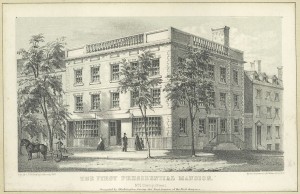
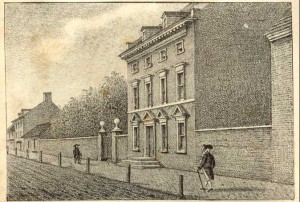 For a time it seemed that our nation couldn’t decide where to put the capitol. The first capitol…for a very short time, was New York City. President George Washington occupied two executive mansions in New York City…the Samuel Osgood House and the Alexander Macomb House. New York began building Government House, but Washington never occupied it. The capitol was moved to Philadelphia. Few people realize that it all began in New York City, nor do they realize that Philadelphia was the first official capitol of the United States. Washington DC became the capitol in December, 1800.
For a time it seemed that our nation couldn’t decide where to put the capitol. The first capitol…for a very short time, was New York City. President George Washington occupied two executive mansions in New York City…the Samuel Osgood House and the Alexander Macomb House. New York began building Government House, but Washington never occupied it. The capitol was moved to Philadelphia. Few people realize that it all began in New York City, nor do they realize that Philadelphia was the first official capitol of the United States. Washington DC became the capitol in December, 1800.
The 1790 Residence Act named Philadelphia the temporary capital for ten years untile the White House could be built on the Potomac River in what is now Washington DC. Philadelphia housed both Continental Congresses and the Constitutional Congress. Both the Declaration of Independence and the Constitution were written in Philadelphia. When it was decided that Washington DC would become the capitol, there was a bit of a fight over the move. While President Washington lived in Philadelphia, he lived in the Market Street mansion, which he altered in ways that may have influenced the White House. In an effort to keep the capitol in Philadelphia, Pennsylvania built a grand presidential mansion a few blocks from the Market Street mansion, but President Washigton declined to occupy it.
President Washington’s term would end before the White House was completed. John Quincy Adams became president and lived in the Market Street mansion from March 1797 to May 1800, having also declined to move into the grand presidential mansion that Pennsylvania had built. Then on June 3, 1800, President Adams moved to Washington DC. The White House was still not finished, so in what I found a shocking move, he moved into the Washington City Hotel, as it was properly named. It was called, and rightfully so, Tunnicliff’s, named after William Tunnicliff, who had it build, and owned it. The Washington City Hotel was in reality, a tavern. A tavern!! That is such a strange place for a US president to choose to live. I’m sure he was excited about 
 moving into the White House, but it would not be finished unto the end of October. President Adams finally moved into the White House on November 1, 1800, making him the only president to live in the Philadelphia mansion, a tavern, and the White House.
moving into the White House, but it would not be finished unto the end of October. President Adams finally moved into the White House on November 1, 1800, making him the only president to live in the Philadelphia mansion, a tavern, and the White House.
Things were much different in those days, of course. I’m sure that there was no big pre-move check of the tavern and the surrouning area, like there would be now. I suppose that there was security to some degree, but in reality most Americans wouldn’t have even known that the president had moved at that time, much less that he was living in a tavern.
 As we grow to adulthood, our life experiences shape the people we become, and one of the biggest life experiences we have is the relationship with our parents. Whether we realize it or not, we are commonly more like one parent than the other, and we can relate to one parent easier than the other. It doesn’t mean that we love one more than the other, just that we have more in common with one than with the other. That doesn’t even determine how well we get along with that parent that we are most alike. Some people can be exactly like on parent, and yet they fight with that parent quite a bit, or sometimes they just get along perfectly with that parent that they are most alike. My sisters and I got along very well with our parents, but as kids, we all had our moments…or was it years. My parents might say it was years. Nevertheless, I can tell you which of us was more like Mom and which of us was more like Dad.
As we grow to adulthood, our life experiences shape the people we become, and one of the biggest life experiences we have is the relationship with our parents. Whether we realize it or not, we are commonly more like one parent than the other, and we can relate to one parent easier than the other. It doesn’t mean that we love one more than the other, just that we have more in common with one than with the other. That doesn’t even determine how well we get along with that parent that we are most alike. Some people can be exactly like on parent, and yet they fight with that parent quite a bit, or sometimes they just get along perfectly with that parent that they are most alike. My sisters and I got along very well with our parents, but as kids, we all had our moments…or was it years. My parents might say it was years. Nevertheless, I can tell you which of us was more like Mom and which of us was more like Dad.
Talking to my niece, Lacey Stevens, I find that my sister, Alena Stevens was a lot like our mom, is a way that had really never occurred to me before. Lacey tells me that her mom, reminds her a lot of her grandma, my mom, Collene Spencer, as she gets older. Our mom has always been a rock collector. It was something her dad, my grandpa, George Byer loved to do, and something he instilled in his kids by taking them on many rock hunting trips. Mom continued to look for pretty rocks for the rest of her life. I’m not sure why it surprised me to find out that Alena loves to find pretty rocks too. She has a prized collection of the rocks she has found, and she wants to keep them all. Mom was that way. She had a rock garden, and if one of the rocks was moved, she knew it. Each rock had its proper place. If one of the grandchildren took one of the rocks to play with, Mom knew it. I don’t know if Alena is that way too, but I suspect that she is, because a true rock  collector knows her collection, and where each on belongs in the display.
collector knows her collection, and where each on belongs in the display.
Another way that Alena is like our mom…one that Lacey finds funny, is that Alena is always getting on her kids about coming over to visit more often. I think that is a trait all my sisters and I have in common with our parents. Our families are very important to us, and we will tell them to come by more often and call more often…basically keep in touch with us better. We didn’t have kids so they could go off and we never hear from them. So while Lacey finds that funny, I find it very normal, as I’m sure my sister, Alena does. Today is Alena’s birthday. Happy birthday Alena!! Have a great day!! We love you!!
 James, it is so hard to believe that yet another of my grand nephews is graduating. It still seems like you should be just a little boy. I know that is crazy, because you and Caalab are the same age, and you are ten days older in fact. The years have flown by so quickly. I remember the day you were born, and every milestone in between that day and graduation. Now you are a man, and we couldn’t be more proud of the man you have become. You are a quiet man much of the time, but the little kids all love being around you so much. Watching you yesterday with Aleesia, and all the fun she was having climbing all over you, and then Raelynn and Audrianna coming in and making a beeline for you. It is so obvious that they all just love you so much.
James, it is so hard to believe that yet another of my grand nephews is graduating. It still seems like you should be just a little boy. I know that is crazy, because you and Caalab are the same age, and you are ten days older in fact. The years have flown by so quickly. I remember the day you were born, and every milestone in between that day and graduation. Now you are a man, and we couldn’t be more proud of the man you have become. You are a quiet man much of the time, but the little kids all love being around you so much. Watching you yesterday with Aleesia, and all the fun she was having climbing all over you, and then Raelynn and Audrianna coming in and making a beeline for you. It is so obvious that they all just love you so much.
 While our minds are able to clearly see all the years that have gone by, and what a cute little boy you were, we find ourselves struggling with the fact that the little boy you were is gone forever now…and in his place is a tall young man, who is ready for the world and the next step in his journey in life. Whether you know exactly where you are headed, or if your plans are still in the works, I know that you will succeed in whatever you decide to do, because you are a person who completes what he starts. Still, today is about a finished race. You have completed all the requirements to receive your high school diploma…the achievement that we take you the longest time among life’s achievements. Before you now stands the next door in your life, and it is up to you to choose where that door will lead. No one else can make the decision for you. Your parents and family can advise you, but the choice is your and yours alone.
While our minds are able to clearly see all the years that have gone by, and what a cute little boy you were, we find ourselves struggling with the fact that the little boy you were is gone forever now…and in his place is a tall young man, who is ready for the world and the next step in his journey in life. Whether you know exactly where you are headed, or if your plans are still in the works, I know that you will succeed in whatever you decide to do, because you are a person who completes what he starts. Still, today is about a finished race. You have completed all the requirements to receive your high school diploma…the achievement that we take you the longest time among life’s achievements. Before you now stands the next door in your life, and it is up to you to choose where that door will lead. No one else can make the decision for you. Your parents and family can advise you, but the choice is your and yours alone.
 For now, James will attend Casper College, and take the required courses for graduation, since he hasn’t settled on a career path for sure. That’s never a bad idea. Taking all the basic classes leaves you with the ones that really interest you when you know where your career is headed. James is also hoping to save money to take a trip to the Netherlands, where his girlfriend is from. Julia is a foreign exchange student at Kelly Walsh, but will be heading home soon, so he wants to go see her there in her home country. Who knows, maybe he will choose to go to college there. Again, only time will tell, but for now, James is simply looking forward to his graduation, because it is the goal he has worked long and hard for. Congratulations James Renville!! We are very proud of you!! Way to go!!
For now, James will attend Casper College, and take the required courses for graduation, since he hasn’t settled on a career path for sure. That’s never a bad idea. Taking all the basic classes leaves you with the ones that really interest you when you know where your career is headed. James is also hoping to save money to take a trip to the Netherlands, where his girlfriend is from. Julia is a foreign exchange student at Kelly Walsh, but will be heading home soon, so he wants to go see her there in her home country. Who knows, maybe he will choose to go to college there. Again, only time will tell, but for now, James is simply looking forward to his graduation, because it is the goal he has worked long and hard for. Congratulations James Renville!! We are very proud of you!! Way to go!!

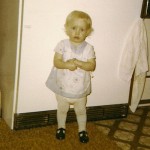 Having my daughter, Amy Royce live so far away, is something that will take a lot of getting used to. I am used to seeing her every day, and now that is not possible. I’m sure that I can count on one hand the number of times I have missed being with her on her birthday in her 39 years. In fact, I if I had to guess, it would be maybe two times. Even then, I saw her within a day or so of her birthday. We have always been a close family, and so this degree of distance between us seems very foreign to me.
Having my daughter, Amy Royce live so far away, is something that will take a lot of getting used to. I am used to seeing her every day, and now that is not possible. I’m sure that I can count on one hand the number of times I have missed being with her on her birthday in her 39 years. In fact, I if I had to guess, it would be maybe two times. Even then, I saw her within a day or so of her birthday. We have always been a close family, and so this degree of distance between us seems very foreign to me.
Of course, my dear Amy, you have been on my mind a great degree lately, and when I think of you, I find my mind flooded with visions of you at every stage of your life. You were my teeny little girl who always felt the need to defend yourself from the other little kids who thought you were a baby doll to be played with. Wow, did they have a shock when they tried to pick you up. You could make it very clear with your ability to scream at the top of your lungs, that carrying you around, would not be tolerated. When you where still very small, with your small amount of blond hair, and your great big eyes, we called you Tweety Bird, because you reminded us so much of the bird in the cartoon. And you were Strawberry Shortcake, because at that time, the currently back in the popular zone toy, first came out, and the term fit you so very well. Of course to your dad, you will always be Squirt. You were such a sweet little girl, and yet you had a stubborn streak that came out when you didn’t get your way or you felt like someone didn’t give you the proper degree of respect in any given situation. 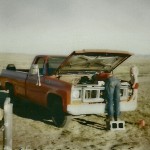
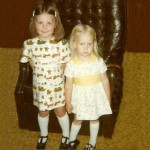 Then your little face would set in anger and determination to win, and pretty much everyone knew to give you some space. You had a funny way of pronouncing some of your words, and somehow, my little Wyoming Girl, sounded just like a Texan…which we always found pretty funny, unless you were trying to explain that you had “dirt” in your eye by saying the you had “dot” in your eye. Boy you could sure get irritated whenever you were misunderstood.
Then your little face would set in anger and determination to win, and pretty much everyone knew to give you some space. You had a funny way of pronouncing some of your words, and somehow, my little Wyoming Girl, sounded just like a Texan…which we always found pretty funny, unless you were trying to explain that you had “dirt” in your eye by saying the you had “dot” in your eye. Boy you could sure get irritated whenever you were misunderstood.
As you grew up, at least in every way but in height, you learned to have a sense of humor about things, especially when it came to reaching things in high places. I remember the time you bought a t-shirt at school that was marked in such a way as to explain to a blond, the proper way to get dressed, because of the blond jokes that have persisted over the years. I found myself shocked, because as a blond, who was almost always not a blond in the intellectual sense of the word, you had decided to embrace that joke. You used to get so angry about being called a blond, so I couldn’t believe that you would buy such a shirt. I guess that you decided that if you couldn’t beat ’em, you might as well join ’em. Because of your small stature, no one could ever really believe your age either. Upon receiving your first traffic ticket, the officer first questioned not if you had you license, but rather if you were old enough to have one at all. And I often wondered if you would need a booster chair to see over the steering wheel in your first car, a Camaro, because back when they were a pretty big car. In fact, I went so far as to give you one that I came across, only to find that you did not agree with my logic concerning this matter. Go figure!!
While you have always seemed younger than your years in looks and size, you have proven yourself to be a 
 wise and very talented girl when it comes to most things in your life. You are a very capable insurance agent, and one that I have been not only proud and happy to work with, but upon your move, an agent that I have been proud to send to your new agency, because they have received a great asset to their company. Your ability to learn the nuances of insurance is amazing. Sadly, our loss is their gain, and we miss you every day…especially your mom. Today in Amy’s birthday. Happy birthday Amy!! Have a great day!! We love you very much!! And ET, don’t forget to call home often. We really need that.
wise and very talented girl when it comes to most things in your life. You are a very capable insurance agent, and one that I have been not only proud and happy to work with, but upon your move, an agent that I have been proud to send to your new agency, because they have received a great asset to their company. Your ability to learn the nuances of insurance is amazing. Sadly, our loss is their gain, and we miss you every day…especially your mom. Today in Amy’s birthday. Happy birthday Amy!! Have a great day!! We love you very much!! And ET, don’t forget to call home often. We really need that.
 My dear grandson, Caalab, today marks the beginning of a completely new life for you. Your graduation is just the first step into that life. You are no longer a child, but a high school graduate. Your hard work has paid off, and all the requirements for graduation have been met. Your public school career is over now, and your future is up to you. That is hard for me to believe, because to me you will always be that little boy who was so quick to smile, and always had some new joke to tell or a new trick to show me. While the joking and trickery continue to this day, the little boy is gone, and before me now stands a man, strong and tall, with a heart of gold. I love the man you have become. You are so caring. You give thought to those around you, and you always try to please others. You think of others long before you think of yourself…a good trait in many ways. Still, I miss that little boy that you were…the one who always had his hand in my hair. I will always have that picture of you in my memory files…twisting my hair or batting it, but never pulling it, because you were always careful not to hurt me.
My dear grandson, Caalab, today marks the beginning of a completely new life for you. Your graduation is just the first step into that life. You are no longer a child, but a high school graduate. Your hard work has paid off, and all the requirements for graduation have been met. Your public school career is over now, and your future is up to you. That is hard for me to believe, because to me you will always be that little boy who was so quick to smile, and always had some new joke to tell or a new trick to show me. While the joking and trickery continue to this day, the little boy is gone, and before me now stands a man, strong and tall, with a heart of gold. I love the man you have become. You are so caring. You give thought to those around you, and you always try to please others. You think of others long before you think of yourself…a good trait in many ways. Still, I miss that little boy that you were…the one who always had his hand in my hair. I will always have that picture of you in my memory files…twisting my hair or batting it, but never pulling it, because you were always careful not to hurt me.
It is a long road from pre-school to high school graduation, and that makes it extra special. When you started  your school career, it seemed like it would be a long time before graduation, but in reality, the time slips by so quickly. Now, all those years are behind you, and you are looking toward a whole new life. Your journey is going to take you far away, and that is really hard for me, but I know that this is your dream career. Music has been your life for as long as I can remember, and yet it was a bit of a surprise to hear that you want to build guitars. It shouldn’t have been I suppose. It really was the next logical step, and I know that you will be great at it. Still, you are leaving and you won’t be able to come home for a weekend here and there. The next time I see you, you will be changed in many ways. You will have spent time in a bigger city, and broadened your horizons. Your life journey will be much different than what I had expected, but that is because your dreams are uniquely yours…and no one else’s. You have to follow your heart and live your dreams…you have to be true to yourself, and be who you were born to be. And I know that you will be very successful at it, because you are an amazing young man.
your school career, it seemed like it would be a long time before graduation, but in reality, the time slips by so quickly. Now, all those years are behind you, and you are looking toward a whole new life. Your journey is going to take you far away, and that is really hard for me, but I know that this is your dream career. Music has been your life for as long as I can remember, and yet it was a bit of a surprise to hear that you want to build guitars. It shouldn’t have been I suppose. It really was the next logical step, and I know that you will be great at it. Still, you are leaving and you won’t be able to come home for a weekend here and there. The next time I see you, you will be changed in many ways. You will have spent time in a bigger city, and broadened your horizons. Your life journey will be much different than what I had expected, but that is because your dreams are uniquely yours…and no one else’s. You have to follow your heart and live your dreams…you have to be true to yourself, and be who you were born to be. And I know that you will be very successful at it, because you are an amazing young man.
When it comes to my babies, my heart just can’t seem to understand the whole saying goodbye thing, and that makes this so very hard. Nevertheless, I would ever want to hold you back. You will go forward and you will be  successful at all you do, wherever life takes you. Still, I want you to always remember where you came from. Remember the good moral values you have been taught, and always keep God first place in your life, because it was God who made you and gave you the skills you have. As you go through life, you will come to realize more and more that every skill you have came from Him to make you into the wonderful man you have become. I know that your new life will be filled with excitement and interesting new things, so all I can ask is that you remember to call your grandparents once in a while, because we will miss you very much, so don’t forget the way home. Words cannot fully express just how proud we are of you. We love you so much. Congratulations on your high school graduation, my dear grandson, Caalab. Way to go!!
successful at all you do, wherever life takes you. Still, I want you to always remember where you came from. Remember the good moral values you have been taught, and always keep God first place in your life, because it was God who made you and gave you the skills you have. As you go through life, you will come to realize more and more that every skill you have came from Him to make you into the wonderful man you have become. I know that your new life will be filled with excitement and interesting new things, so all I can ask is that you remember to call your grandparents once in a while, because we will miss you very much, so don’t forget the way home. Words cannot fully express just how proud we are of you. We love you so much. Congratulations on your high school graduation, my dear grandson, Caalab. Way to go!!

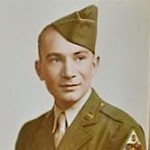 I was talking with my nephew, Steve Spethman the other day, when he mentioned that he knew very little about his grandfather, Fredrick Albert Spethman. Being a genealogy buff, I simply could not resist the challenge that presented. He had a picture of his grandfather, and knew that he had died in Oregon, and his grandmother’s first name, Joanne. He also knew his great grandfathers name, Patrick Spethman, as his own son, Xander Patrick was named after that grandfather. And he knew his great grandmother’s name, Meta Spethman. It was enough. I was able to find his grandparents’ marriage certificate and a little bit more information, including an index concerning his World War II service. The rest will come as it always does, as other people add what they know to what I have found out. Once this kind of search gets started, it always has a way of growing.
I was talking with my nephew, Steve Spethman the other day, when he mentioned that he knew very little about his grandfather, Fredrick Albert Spethman. Being a genealogy buff, I simply could not resist the challenge that presented. He had a picture of his grandfather, and knew that he had died in Oregon, and his grandmother’s first name, Joanne. He also knew his great grandfathers name, Patrick Spethman, as his own son, Xander Patrick was named after that grandfather. And he knew his great grandmother’s name, Meta Spethman. It was enough. I was able to find his grandparents’ marriage certificate and a little bit more information, including an index concerning his World War II service. The rest will come as it always does, as other people add what they know to what I have found out. Once this kind of search gets started, it always has a way of growing.
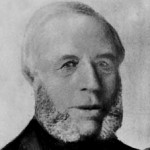 That information was exciting for me, as Steve is pretty special to me, but then I got a big surprise. Steve’s 3rd great grandfather, Johann Joachim Daniel Spethmann, who Americanized his name to John, was born in Oldenburg, Germany. To many people I don’t suppose that this information would be so interesting, but my husband, Bob Schulenberg’s family has a long history in Oldenburg. It dates back beyond the time of Steve’s grandfather’s birth, and the Schulenberg family is still there today. I’m not saying that the Spethmann family and the Schulenberg family are related, although it is entirely possible, but considering the fact that Oldenburg wasn’t that large a town back then, it is quite likely that they knew each other. Maybe, they were even friends.
That information was exciting for me, as Steve is pretty special to me, but then I got a big surprise. Steve’s 3rd great grandfather, Johann Joachim Daniel Spethmann, who Americanized his name to John, was born in Oldenburg, Germany. To many people I don’t suppose that this information would be so interesting, but my husband, Bob Schulenberg’s family has a long history in Oldenburg. It dates back beyond the time of Steve’s grandfather’s birth, and the Schulenberg family is still there today. I’m not saying that the Spethmann family and the Schulenberg family are related, although it is entirely possible, but considering the fact that Oldenburg wasn’t that large a town back then, it is quite likely that they knew each other. Maybe, they were even friends.
I realize that if you go back far enough, you will find that we are all related, as we all came from Adam and Eve, but as time has progressed, it is harder and harder to come up with the exact connections that exist between each of us. I have been able to find connections for Bob and me, on two sides of his family to one of mine. We are 10th cousins on one side and 12th cousins on another. That is such a strange thought to me, and now to find 
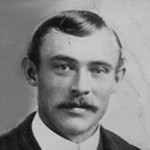 such a close connection with Steve’s family has added another interesting twist to the family history, and one that I am eager to explore. Time will tell if we are related in a way that can easily be figured…such as a marriage, and if it is the case, my guess is that I will stumble on that information, as I have in so many others, when I least expect to find such a connection. Nevertheless, finding this or any other information to add to the family history is always an exciting day, and in this case, it all started with the discovery of a common birthplace.
such a close connection with Steve’s family has added another interesting twist to the family history, and one that I am eager to explore. Time will tell if we are related in a way that can easily be figured…such as a marriage, and if it is the case, my guess is that I will stumble on that information, as I have in so many others, when I least expect to find such a connection. Nevertheless, finding this or any other information to add to the family history is always an exciting day, and in this case, it all started with the discovery of a common birthplace.
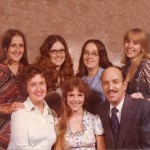 As little girls, my sisters and I would get very excited when our different grown cousins, aunts, or uncles would come over. Like all little kids, we would want to hang out with the adults, and tell them about everything we knew…or could dream up. I think this is as common among kids, as breathing is. Maybe it is about someone new to listen to your stories or maybe it’s that everyone in the household has already heard them, so they don’t want to listen again…or maybe it’s just that you like the person who has showed up. Whatever the reason, you just can’t seem to hold yourself back…or at least that was how it was when I was a kid.
As little girls, my sisters and I would get very excited when our different grown cousins, aunts, or uncles would come over. Like all little kids, we would want to hang out with the adults, and tell them about everything we knew…or could dream up. I think this is as common among kids, as breathing is. Maybe it is about someone new to listen to your stories or maybe it’s that everyone in the household has already heard them, so they don’t want to listen again…or maybe it’s just that you like the person who has showed up. Whatever the reason, you just can’t seem to hold yourself back…or at least that was how it was when I was a kid.
Now, fast forward about 50 years. A couple of days ago, I had to take some groceries to my nieces house for my grandson’s graduation party, which she is graciously holding at her home for my daughter. I had called to let them know I was coming, and they were on a walk, so when I got there, I just waited in my car. Pretty quickly, two of my grand nephews, Xander and Isaac came running up to my car. They had run ahead, obviously excited that I was there. Xander is twelve now, and so was a little better able to contain his excitement, but Isaac being only eight, was not able to do so as easily. While Xander ran back to let his parents know I was there, Isaac decided that he could bring everything up to the porch. He proudly carried five bags at once, and the bags were up on the porch in no time.
After his parents got back to the house, we were inside talking, and the kids, including Zack and Aleesia, all  wanted to tell me or show me things. They were so excited to have me there. I was suddenly taken back those 50 plus years, to my own childhood, and I could so completely relate to how they were feeling. I could tell that their parents, Jenny and Steve Spethman, were thinking that they should stop the kids from chattering, but for me, it was really cute. I guess that it gave me a picture of what my sisters and I had looked like to our family members all those years ago. I don’t think they were ever irritated with us. They just knew that we loved them very much. As I recall, they always listened to our stories and made us feel like we belonged…never acting like we should just go play. I thought that now, I was that aunt that all the little ones were so excited to see and talk to. It made me smile, because it was such a special place to be.
wanted to tell me or show me things. They were so excited to have me there. I was suddenly taken back those 50 plus years, to my own childhood, and I could so completely relate to how they were feeling. I could tell that their parents, Jenny and Steve Spethman, were thinking that they should stop the kids from chattering, but for me, it was really cute. I guess that it gave me a picture of what my sisters and I had looked like to our family members all those years ago. I don’t think they were ever irritated with us. They just knew that we loved them very much. As I recall, they always listened to our stories and made us feel like we belonged…never acting like we should just go play. I thought that now, I was that aunt that all the little ones were so excited to see and talk to. It made me smile, because it was such a special place to be.
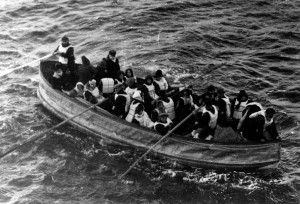 Whenever a big train wreck, plane crash, ship sinking, or other major accident occurs, someone must investigate. Depending on what happened, it can be someone like the NTSB, or in some cases, as in the Titanic sinking, it can go as high as the Senate. Of course, answers need to be found, so that corrections in procedure can be made.
Whenever a big train wreck, plane crash, ship sinking, or other major accident occurs, someone must investigate. Depending on what happened, it can be someone like the NTSB, or in some cases, as in the Titanic sinking, it can go as high as the Senate. Of course, answers need to be found, so that corrections in procedure can be made.
In the case of the Titanic, the accident was brought before the Senate Commerce Committee. I think most of us know the story of the Titanic well, given the movies and documentaries that have come out about it. The official final report, however, went into much more detail than most people know about, and more than I can go into here. I think most of us know that the ship was not sufficiently run through the test trials to properly break in the engines. Nevertheless, the Titanic was run at full speed through trecherous waters, without regard for the damage that could have come to pass.
In addition to this problem, it was noted that many of the crew members did not join the ship until just a few hours before it sailed, and the only drill carried out, consisted of lowering just two lifeboats on the starboard side into the water. There was no boat list designating the stations members of the crew were posted to until several days after sailing. This left the crew in ignorance of their stations until the following Friday morning. Of course, as we all know, there were not enough lifeboats on the ship, because it was thought to clutter the deck, and to be unnecessary. In reality there were only boats enough for only 1,176 of the 2,228 people on board…and of those, only 710 survived, meaning that lifeboats were lowered only partially loaded. Had the Titanic been loaded to full capacity, which was 3,339 passengers and crew, there would have only been room for a third of the people on the lifeboats. and as was the case of only loading the lifeboats half full, 2,629 people would have died.
It was the conclusion of the Senate Commerce Committee, that there were several areas of gross negligence 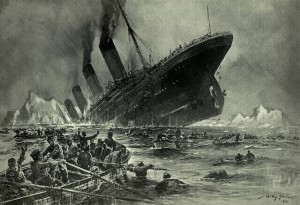 on the part of White Star Line and the crew of the Titanic. In fact the committee was actually appalled, as it should have been. They called the Titanic, and unnecessary tragedy. Improperly trained crew and improper procedures, can be a deadly mix, and as was the case with Titanic, death is what ensued. Many laws have changed as a result of the hearings, but I have to wonder why it takes such a devastating accident to bring about a proper, concervative apporoach to the handling of many areas of transportation, construction, and work ethic. To me, it seems a little late to try to put proper safety methods in place when the ship has already sunk, but then I guess it does protect those who will come after.
on the part of White Star Line and the crew of the Titanic. In fact the committee was actually appalled, as it should have been. They called the Titanic, and unnecessary tragedy. Improperly trained crew and improper procedures, can be a deadly mix, and as was the case with Titanic, death is what ensued. Many laws have changed as a result of the hearings, but I have to wonder why it takes such a devastating accident to bring about a proper, concervative apporoach to the handling of many areas of transportation, construction, and work ethic. To me, it seems a little late to try to put proper safety methods in place when the ship has already sunk, but then I guess it does protect those who will come after.

